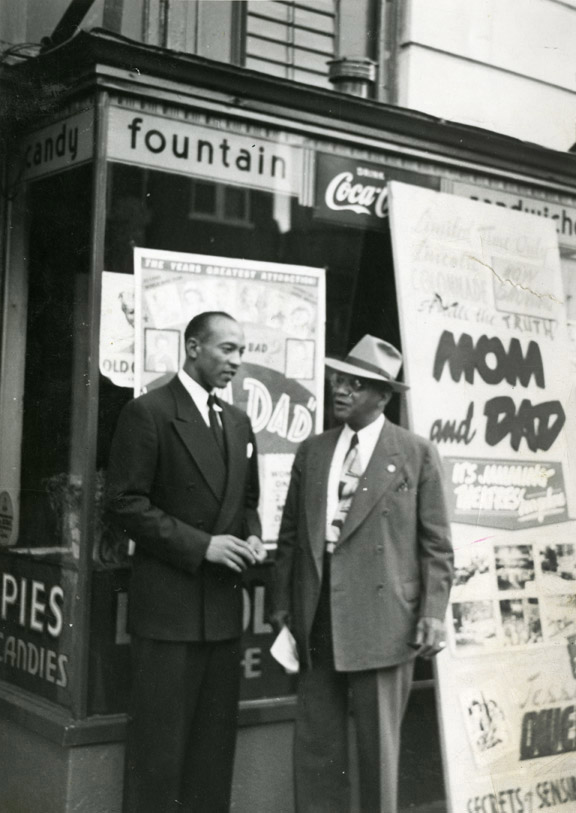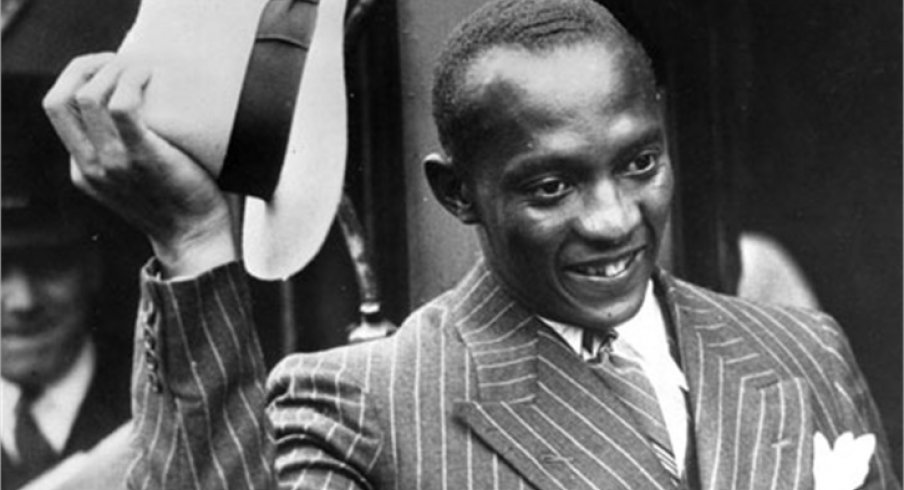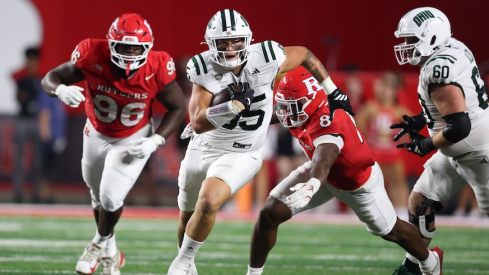Jesse Owens is one of Ohio's truly mythic heroes. He's John Brown and Captain America rolled up into one man; a superhero we venerate but usually know next to nothing about besides his breathtaking, thrice world-record setting performance on the track and traveling to the 1936 Berlin Olympics to chuck the idea of Aryan supremacy into the garbage disposal of history where it belongs.
And that's enough for a myth. You make Hitler look like a gigantic tool on his home turf, and you're pretty much set for life in the hearts and minds of any freedom loving human being. Your life, your actual life that you lived, doesn't really matter all that much anymore. What does matter is that people can make statues of you and name things after you and maybe vote for you in an online poll every once in a while, and that's enough to make us happy. Because the memory of you doing what you did and how you did it was all the eulogy that anyone will ever need for you.
But, if we're going to talk about Owens, the first thing that we should do is get his name right.
Jesse Owens was actually born James Cleveland Owens, and "Jesse" is owed to a teacher with a bad knack for southern accents. Ohio claims Owens, and it should, because just as millions of other black families did in the early part of the 20th century, Owens and his family left a deeply segregated Alabama for better job and living opportunities in the north. So when J.C.'s drawl made out "Jesse" to his teacher's ears, the name stuck, and it would be the first of a lifetime of weird distortions of who Owens was.
For instance: Owens was never a scholarship athlete at Ohio State. OSU didn't offer scholarships to track and field athletes, so Owens had to take on a number of odd jobs, including acting as a page at the statehouse, to get by in college. He was also repeatedly subjected to the casual and overt racism of the time; Ohio State didn't even allow Owens to live on campus.
Still, his 1935 performance at the Big Ten championships was and still is rightfully regarded as a big deal (setting three world records in under 45 minutes will do that), but it really shouldn't be that he set those records that impresses you, it should be the longevity of those records. His long jump of almost 27 feet remained untouched for over 25 years after he set it. His 100 yard dash lasted for 15.
So it was no surprise that Owens dominated in the Berlin Olympic games a year later. According to our favorite myths, Owens runs really fast, jumps really far, and Hitler throws a hissy fit while an unassuming black man shatters misconceptions about race and athleticism. And Owens did kind of do that. Hitler was reportedly at least mildly irritated with Owens' success, handwaving it away as just part of the inherent physical advantages of an "uncivilized race."
But then again, it's known that Hitler had a reaction. On the other hand, Owens had this to say about his American reception:
"Hitler didn't snub me – it was FDR who snubbed me. The president didn't even send me a telegram."
I think that in a lot of ways the experiences that Owens had with racism as a young man should inform some of the choices that he made as an adult. Even during the ticker tape parades and interviews and photo ops, Owens and his family were subjected to persistent discrimination; his family was denied rooms at hotels in New York City, were forced to ride freight elevators, and as an amateur athlete Owens was denied any real opportunity to make money off of his image. Owens refused to acknowledge that stance, and cashed in anyway.

That much of that denial of income can be attributed to racism is undeniable, but by the 1940s he had been stripped of amateur status by the governing bodies in the United States, and had been reduced, again, to working odd jobs for money.
Images like this one of Jesse Owens racing horses seem quaint and silly, but they were also desperate money making ideas from a man without a steady source of income. Bizarrely, Owens also helped promote Mom and Dad, a lurid exploitation film which masqueraded as an educational health movie to get around various film codes prohibiting smoking, violence, and nudity. Eventually, Owens was working as a gas station attendant and was later prosecuted for tax evasion. If not for a lenient judge, could've ended up serving hard time for not reporting his income.
That's the Jesse Owens that I think people need to be aware of; a man denied his place at a table due to an inherently racist and unfair system, who in his own words simply wanted "something for himself." That he was critical of Tommie Smith and John Carlos' black power salute in the 1968 Olympics isn't surprising:
The only time the black fist has significance is when there's money inside. There's where the power lies.
And neither is his retraction, where he praised Smith and Carlos in a later book.
Because that's the rub: we remember Jesse Owens for two singular events, and we want to keep it that way. When Owens wanted to parlay that into a longer legacy, he was ignored and denied opportunities to do so, and it was only when he hit relative rock bottom that people began to see the injustice of an American hero resorting to pumping gas and promoting stag films. He spent the remainder of his life promoting the Olympics and being an international ambassador for United States sports, a role most people would see as more befitting a man who pantsed the Nazis on their home turf.
The story of Jesse Owens is fascinating to me because it's more than just a story of a person who achieved Olympic glory early in life and then coasted on his accolades until a peaceful death surrounded by adoring friends and family. Instead, Owens was forced to be opportunistic because of an unfair system of stark amateurism that was reinforced by the endemic racism that existed in the United States.
Other athletes could use their celebrity as a means to make a buck without worrying about being shut out from other jobs because of the color of their skin; Owens didn't have that luxury. Other athletes were able to make sound investments to keep their finances in order; Owens did not. Other athletes felt that they had the security and standing to back the actions of Tommie Smith and John Carlos; Owens found that difficult.
There's more than an incidental connection in Jesse Owens' life to the situation that collegiate athletes find themselves in today. The racism that impacted his life persists in other forms, and it's telling that the NCAA today has roughly the same attitude toward maintaining a facade of amateurism that the Olympics had in the 1940s. It took decades for the IOC to rectify these policies for the better, at the expense of the livelihoods of people like Jesse Owens. Hopefully it doesn't take society as a whole or the NCAA in particular as long to take a more proactive stance about the ability of their student-athletes to improve their lives.
James Cleveland Owens lived a complex, difficult life. I'm sure that he and his family took comfort that he was given the recognition and legacy that he deserved later in life, as he worked with the United States Olympic committee. But the lessons of his life, his entire life, are just as important to learn as any race he ever won.


